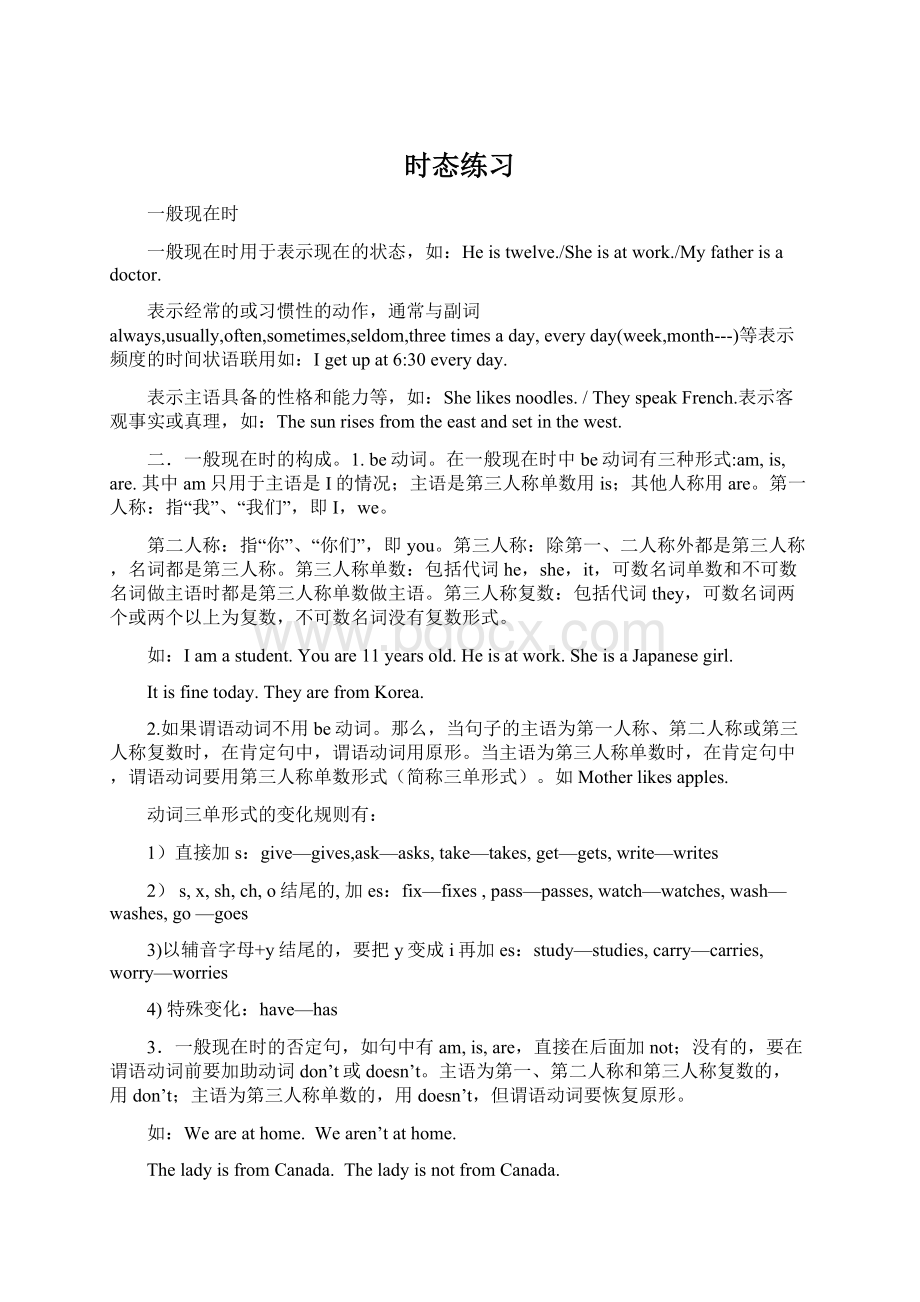时态练习.docx
《时态练习.docx》由会员分享,可在线阅读,更多相关《时态练习.docx(16页珍藏版)》请在冰豆网上搜索。

时态练习
一般现在时
一般现在时用于表示现在的状态,如:
Heistwelve./Sheisatwork./Myfatherisadoctor.
表示经常的或习惯性的动作,通常与副词always,usually,often,sometimes,seldom,threetimesaday,everyday(week,month---)等表示频度的时间状语联用如:
Igetupat6:
30everyday.
表示主语具备的性格和能力等,如:
Shelikesnoodles./TheyspeakFrench.表示客观事实或真理,如:
Thesunrisesfromtheeastandsetinthewest.
二.一般现在时的构成。
1.be动词。
在一般现在时中be动词有三种形式:
am,is,are.其中am只用于主语是I的情况;主语是第三人称单数用is;其他人称用are。
第一人称:
指“我”、“我们”,即I,we。
第二人称:
指“你”、“你们”,即you。
第三人称:
除第一、二人称外都是第三人称,名词都是第三人称。
第三人称单数:
包括代词he,she,it,可数名词单数和不可数名词做主语时都是第三人称单数做主语。
第三人称复数:
包括代词they,可数名词两个或两个以上为复数,不可数名词没有复数形式。
如:
Iamastudent.Youare11yearsold.Heisatwork.SheisaJapanesegirl.
Itisfinetoday.TheyarefromKorea.
2.如果谓语动词不用be动词。
那么,当句子的主语为第一人称、第二人称或第三人称复数时,在肯定句中,谓语动词用原形。
当主语为第三人称单数时,在肯定句中,谓语动词要用第三人称单数形式(简称三单形式)。
如Motherlikesapples.
动词三单形式的变化规则有:
1)直接加s:
give—gives,ask—asks,take—takes,get—gets,write—writes
2)s,x,sh,ch,o结尾的,加es:
fix—fixes,pass—passes,watch—watches,wash—washes,go—goes
3)以辅音字母+y结尾的,要把y变成i再加es:
study—studies,carry—carries,worry—worries
4)特殊变化:
have—has
3.一般现在时的否定句,如句中有am,is,are,直接在后面加not;没有的,要在谓语动词前要加助动词don’t或doesn’t。
主语为第一、第二人称和第三人称复数的,用don’t;主语为第三人称单数的,用doesn’t,但谓语动词要恢复原形。
如:
Weareathome.Wearen’tathome.
TheladyisfromCanada.TheladyisnotfromCanada.
Iwanttogototheparty.Idon’twanttogototheparty.
Theyhavesomecartoonbooks.Theydon’thaveanycartoonbooks.
Thebullrunsfasterthanthelion.Thebulldoesn’trunfasterthanthelion.
Mikelikesswimmingandskating.Mikedoesn’tlikeswimmingorskating.
4.一般现在时的疑问句,如句中有am,is,are,把其提到主语前即可;没有am,is,are的,要在主语前加助动词do或does。
第一、第二人称和第三人称复数作主语的,用do;第三人称单数作主语的,用does,谓语动词要恢复原形。
注:
一般现在时常用于if,when,assoonas,until,等词引导的时间,条件等状语从句中表示将来要发生的动作或状态,从句用一般现在时,即“主将从现”。
如:
A.用括号中所给动词的适当形式完成句子。
1.Itisspringnow.Jimoften________(climb)themountainswithhisbrother.
2.Jackoften_________(watch)TVafterworkthesedays.
3.Mr.Black__________(getup)ataquartertoseveneverymorning.
4._________you_________(know)histelephonenumber?
5.Usuallymyfather_________(catch)theNo.11bus_______(go)towork,butsometimeshe_____(go)bytaxi.
6._________(be)everyoneheretoday?
7.SueandI_________(be)goodstudents.
8.Mr.Brown__________(look)veryyoung.
9.I___________(nothave)anEnglishbook.
10.He_________(go)tobedatnineintheevening.
B.单项选择。
()1.—DoesJimhaveapear?
–Yes,he_____.
A.isB.haveC.doD.does
()2.Idon’t_____breakfast,butmysister_____.
A.has;hasB.have;doesn’tC.has;haveD.have;does
()3.Jackdoesn’t_____pears,butLily_____toeatthemverymuch.
A.likes;likeB.like;likesC.like;likeD.likes;likes
()4.—What_____shedo?
–Sheisateacher.She_____French.
A.is;teachB.does;teachC.does;teachesD.do;teaches
()5.She_____fishingwithhersistereverySunday.
A.isgoingB.shallgoC.goD.goes
()6.MrsRead______thewindowsonceamonth.
A.iscleaningB.cleanC.cleaningD.cleans
()7.Tomisaworker,he_____inafactory.
A.workingB.worksC.workD.iswork
()8.We_______musicandoften______tomusic.
A.like,listenB.likes,listensC.like,arelisteningD.arelike,arelistening
()9.MrGreenwillwritetomeassoonashe________toNewYork.
A.willgetB.getC.getsD.areget
()10.Theywillhaveafootballmatchifit________nextSunday.
A.rainB.rainsC.doesn’trainsD.doesn’train
C.用括号中所给动词的适当形式填空。
WangLin_______(be)aschoolboy.He______(live)inBeijing.He________(study)inamiddleschool.
WangLin_____(get)upathalfpastfiveeveryday.Afterthathe________(read)EnglishandChinese.He_______(have)breakfastatseven.WangLin________(go)toschoolsixdaysaweek.Inclasshe________(listen)totheteachercarefullyandhisteacher_________(like)himverymuch.,
Afterschoolheusually______(play)gamesforhalfanhour.He_______(come)backhomeataboutfive.Intheeveninghe________(do)hishomework.Afterhe_______(finish)hishomework,he_______(watch)TVforlessthananhour.He_______(go)tobedataboutten.
D.用方框中词的适当形式填空。
have,take,comefrom,prefer,geton,hearfrom,return,walk
1.MrLi___________ricetobread.Whataboutyou?
2.Sometimestheygotoschoolbybike,sometimesthey________toschool.
3.Mymotherusually________threemealsathome.
4.Sheoften_________herparentsandwritestothemintime.
5.Heisnotagoodstudentbecausehenever____________thebookstothelibraryontime.
6.Myparentsoften________metovisitsomeplacesofinterestinsummerholidays.
7.He________wellwithhisclassmatesandteachers.
8.Who__________Canadainourschool?
ThePresentContinueTense现在进行时
1、现在进行时表示现在(说话瞬间)正在进行或发生的动作,常与now,look,listen等词连用。
如:
HeiswatchingTVnow.或在语境中,如:
1)Itisseveno’clock.Jimisdoinghishomework.
2)Don’ttalkhere,thebabyissleeping.
3)Wherearethestudents?
Theareclimbingthemountain.
也可表示当前一段时间内的活动或现阶段正在进行的动作。
如:
I’mwritinganovelthesedays.
2、现在进行时的谓语结构为:
be(am/is/are)+动词现在分词(doing)
3、动词的现在分词变化规则有:
1)直接加ing:
do—doing,play—playing,look—looking,listen—listening,watch—watching,carry—carrying,
2)以不发音e结尾的,去e加ing:
come—coming,dance—dancing,make—making,
write—writing,drive—driving,ride—riding,
3)重读闭音节结尾的,双写结尾字母再加ing:
get—getting,put—putting,run—running,
shop—shopping,forget—forgetting,sit—sitting,hit—hitting,cut—cutting
4、现在进行时的否定句,只须在am/is/are后加not。
如:
Iamlisteningtotheradio.I’mnotlisteningtotheradio.
Fatherisreadingnewspaper.Fatherisn’treadingnewspaper.
Theforeignersarevisitingourschool.Theforeignersaren’tvisitingourschool.
Itisrainingheavilyoutside.Itisn’trainingheavilyoutside.
5、现在进行时的疑问句,把am/is/are提到主语前面即可。
如:
Emilyisworkingonthecomputer.IsEmilyworkingonthecomputer?
---Yes,sheis./No,sheisn’t.
Thestudentsarehavingaclassnow.Arethestudentshavingaclassnow?
---Yes,theyare./No,theyaren’t.
Itissnowinginthenorth.Isitsnowinginthenorth?
---Yes,itis./No,itisn’t.
Heislisteningtothemusic.(对划线部分提问)Whatishedoing?
练习:
A.用所给动词的适当形式填空。
1.Heis__________(dance)now.
2.Georgeis__________(fly)akitewithhisfriendsnow.
3.MaryisanAmericangirl.She__________(sing)quitewell.Listen!
She__________(sing)anewEnglishsong.Canyou___________(hear)her?
4.Thestudents______________(listen)tothebirthdaysongnow.
5.Look!
Mike______________(sit)atthefootofthehill.
6.Don’tmakeanynoise.Thestudents__________(have)animportantmeeting.
7.It’sseveno’clockintheevening.TheSmithfamily____________(watch)TV.
8.“Wherearethestudents?
”“They__________(play)footballontheplayground.”
9.“________yourmother________(cook)?
”“Yes,sheis.”
10.Listen.Someone__________(cry)overthere.
B.单项选择。
1.—What______youdoingnow?
---I______drawinganapple.
A.are;amB.is;areC.are;areD.am;are
2.Look,thetaxi______now.
A.cameB.comeC.comesD.coming
3.Weare______baseballmatchnow.
A.lookingB.seeingC.watchingD.iscoming
4.Listen!
Who______inthenextdoor?
A.issingingB.aresingingC.singD.sings
5.---Whereisyourfather?
---He_____hiscarintheyard.
A.washesB.washC.iswashingD.washing
6.---______Jackandhisbrother_______?
--Yes,theyare.
A.is;skatingB.is;skateingC.are;skateingD.are;skating
7.It’seighto’clock..Thestudents_________anEnglishclass.
A.haveB.havingC.ishavingD.arehaving
8.Don’ttalkhere.Grandparents____________.
A.issleepingB.aresleepingC.sleepingD.sleep
C.将下列句子译成英语。
1、我们正在上英语课。
__________________________
2、看!
大明正在操场上打篮球。
他每周日下午打篮球。
____________________________
3、Tom在房间听音乐。
_________________________________
4、Mary没在弹钢琴。
她在打扫房间。
_______________________________________
5、谁在读英语?
_______________________________________________
ThePastContinueTense过去进行时
1、过去进行时表示过去某一时刻正在进行或发生的动作,常与atthattime,atthatmoment,atthistimelast(yesterday,Monday,week---),at8:
00yesterday等词连用。
如:
Hewasreadingnewspaperatthistimeyesterday.
也可用于when,while等引导的时间状语从句中。
如:
Itwasrainingwhentheyleftthehospital.
Whilemymotherwascooking,Iwascleaningthehouse.
2、过去进行时的谓语结构为:
was/were+动词现在分词(doing)
3、过去进行时的否定句,只须在was/were后加not。
4、过去进行时的疑问句,把was/were提到主语前面即可。
练习:
A.用所给动词的正确形式填空。
1. Jim_________(write)aletteratthatmoment.
2. Whenthetelephone________(ring),she________(do)herhousework.
3. WhenI________(leave)theparty,thepeople________(enjoy)themselves.
4. Whenmybrother________(come)intotheroom,I________(telephone)Mary.
5. Whilethechildren______(play)outside,theirmother________(cook)theirdinner.
TheSimpleFutureTense一般将来时
1、一般将来时表示将来某个时间要发生的动作或存在的状态,也表示将来经常或反复发
生的动作,常与表示将来的时间状语连用,如:
tomorrow,thedayaftertomorrow,next(week,Sunday,month,year---),soon,intwohours,inthefuture等。
如:
I’mgoingtomakeamodelplanebymyselftomorrow.
Sheisgoingtoseeherparentsnextmonth.
Theywillbebacksoon..
2、一般将来时的谓语结构:
助动词(will或begoingto)+动词原形
注意:
在疑问句中,主语为I或we时,助动词用shall;
如:
Shallwego?
WhatshallIdonext?
1)书面语中,主语为I或we时,常用shall+动词原形;但在口语中,无论肯定句或否定句,所有人称都可以用will.如:
Weshallbeverypleasedtoseeyou.
2)Shallwe…?
还可作为建议或征求对方意见时的用语。
如:
Shallwehavearest?
Shallwegoattenintheafternoon?
3、will和begoingto的区别:
1)will:
1.表示“带意愿色彩的将来”,即纯粹的将来,与现在无关。
2.问对方是否愿意,或表示客气的邀请或命令时,常用willyou(please)…?
如:
We’llgotherebybike.
TherewillbeanEnglishpartytomorrowevening.
Willyoupleasestopsmoking?
2)begoingto:
表示将要发生的事,或打算好、已在计划、决定要做的事,现在比较确定。
如:
Whatareyougoingtodotonight?
Theyaregoingtomeetatthecinemagate.
Lookattheblackclouds!
It’sgoingtorain.
4、在否定句中,只须在will或be(am,is,are)后加not;在疑问句中,把wi